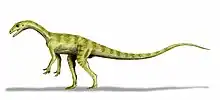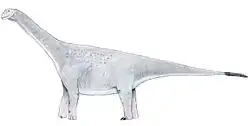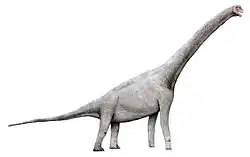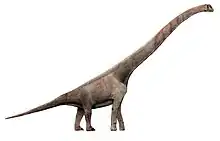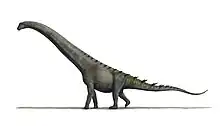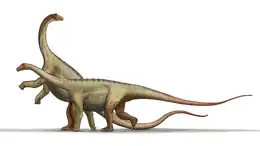Huangshanlong
Huangshanlong (meaning "Huangshan dragon") is a genus of mamenchisaurid dinosaurs native to the Anhui province of China. It contains a single species, Huangshanlong anhuiensis. H. anhuiensis represents, along with Anhuilong and Wannanosaurus, one of three dinosaurs found in Anhui province.
| Huangshanlong Temporal range: Middle Jurassic, | |
|---|---|
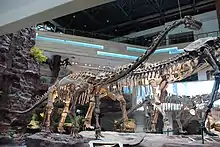 | |
| Reconstructed skeleton, Anhui Geological Museum | |
| Scientific classification | |
| Domain: | Eukaryota |
| Kingdom: | Animalia |
| Phylum: | Chordata |
| Clade: | Dinosauria |
| Clade: | Saurischia |
| Clade: | †Sauropodomorpha |
| Clade: | †Sauropoda |
| Family: | †Mamenchisauridae |
| Genus: | †Huangshanlong Huang et al., 2014 |
| Type species | |
| †Huangshanlong anhuiensis Huang et al, 2014 | |
Discovery and description
The only specimen consists of a partial forelimb discovered in 2002 during the construction of the Huihang Highway. It can be distinguished from other mamenchisaurids in having the following unique combination of features: such as transverse length of the proximal end of the humerus is 36% of the total length of the humerus, accessory processes are located near the middle of the cranial edge of the distal end of the humerus, length of the radius is 58% of that of the humerus, length of the ulna is two thirds of that of the humerus, craniomedial process on the proximal end of the ulna is longer than the craniolateral one, and ridges develop on the cranial, caudomedial, and caudolateral faces of the distal portion of the ulna.[1]
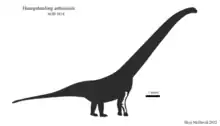
Ren et al. (2018) recover Huangshanlong as sister to Anhuilong and Omeisaurus in a clade within Mamenchisauridae exclusive of other mamenchisaurids.[2]
References
- Jian-Dong Huang; Hai-Lu You; Jing-Tao Yang; Xin-Xin Ren (2014). "A new sauropod dinosaur from the Middle Jurassic of Huangshan, Anhui Province" (PDF). Vertebrata PalAsiatica. 52 (4): 390–400.
- Xin-Xin Ren; Jian-Dong Huang; Hai-Lu You (2018). "The second mamenchisaurid dinosaur from the Middle Jurassic of Eastern China". Historical Biology: An International Journal of Paleobiology. 32 (5): 602-610. doi:10.1080/08912963.2018.1515935.
